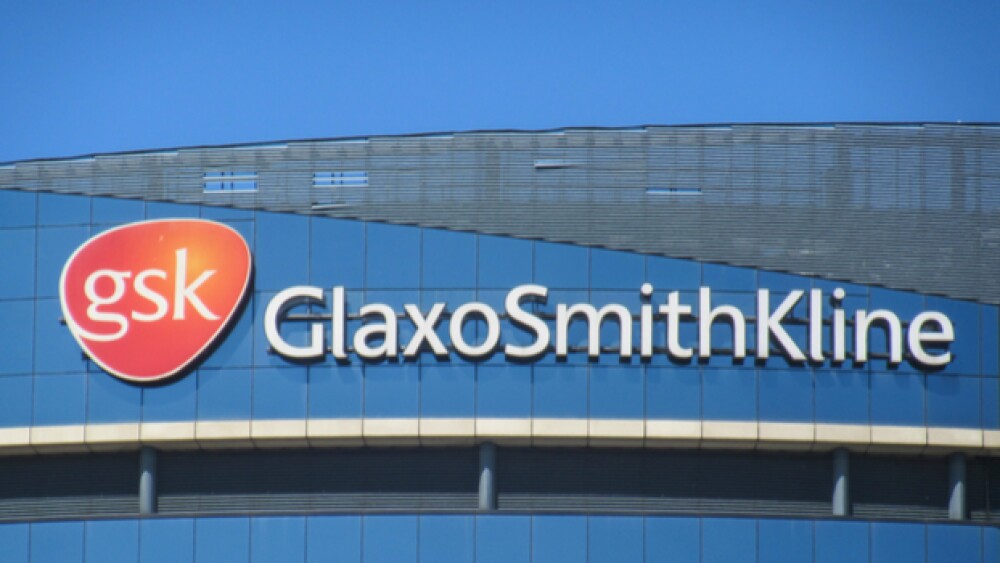GSK’s RSV vaccine candidate met its primary endpoint in a pivotal Phase III trial, proving to be highly effective against RSV-associated lower respiratory tract disease.
Willy Barton/Shutterstock
GlaxoSmithKline’s RSV vaccine candidate met its primary endpoint in a pivotal Phase III trial, proving to be highly effective against RSV-associated lower respiratory tract disease (LRTD), the company announced Thursday.
Seven of the 12,466 study participants inoculated with GSK’s shot developed RSV-LRTD. In the placebo arm, 40 cases of RSV-LRTD arose in 12,494 vaccinees. This resulted in an overall vaccine efficacy rate of 82.6%, which satisfied the trial’s primary efficacy threshold.
The vaccine candidate was even more effective for patient subgroups that might be at greater risk of poor clinical outcomes. GSK’s RSV shot demonstrated efficacy of 93.8% in participants between the ages of 70 and 79.
In those with underlying comorbidities, like cardiorespiratory or metabolic conditions, the candidate was found to be 94.6% effective. Against severe RSV-LRTD, it had an efficacy of 94.1%.
The GSK jab was also highly effective against both the RSV-A and RSV-B subtypes, with respective efficacy rates of 84.6% and 80.9%, indicative of its ability to elicit a broad and robust neutralizing antibody response.
The candidate failed to show significant benefit in two patient subgroups: those 80 years or older and those who were frail. In an email to BioSpace, Alison Hunt, MPH, director of U.S. corporate communications and government affairs attributed these to the low number of participants in these subgroups.
Thursday’s data reveal comes from the AReSVi-006 trial, a randomized and observer-blinded trial enrolling some 25,000 participants, all aged 60 years and above, across 17 countries.
The study also assessed for safety and found a favorable tolerability profile, with most adverse events only mild-to-moderate in severity. The most common side effects were fatigue, headache, myalgia and injection site pain.
Using its Phase III performance as a basis, GSK plans to submit regulatory applications for the candidate before the end of the year.
The RSV Race Heats Up
Joining GSK at the head of the RSV race is Pfizer, which in August also reported positive Phase III data for its candidate. In the RENOIR trial, Pfizer’s vaccine showed an overall efficacy rate of 66.7%. For more severe infections, the candidate was 85.7% effective.
These figures would put GSK slightly ahead of Pfizer on paper, but cross-trial comparisons are tricky and largely unscientific. While RENOIR and AReSVi-006 focused their recruitment on individuals aged 60 years or older, slight differences, such as how endpoints are defined, make direct comparisons of outcomes difficult.
“Although it is difficult to directly compare data from different clinical studies, we believe our magnitude of result, along with consistent high efficacy across adults aged 70 to 79 years, and A & B strains, has best-in-class potential,” Hunt said.
Pfizer is also eyeing a 2022 biologics license application submission to the FDA.
Slightly lagging behind GSK and Pfizer are other industry heavy-hitters.
Moderna has launched a Phase III study to evaluate mRNA-1345, its mRNA vaccine candidate for RSV, in up to 34,000 participants, the company announced during its annual R&D day in September. Moderna expects an initial readout later this year or early in 2023.
In October last year, Janssen revealed results of its Phase IIb CYPRESS study, touting an 80% vaccine efficacy of its candidate against RSV-LRTD. Based on this data, Janssen launched the Phase III EVERGREEN trial, seeking to enroll around 23,000 participants. Like GSK and Pfizer, Moderna and Janssen assess their respective candidates in older adults aged 60 years and above.






